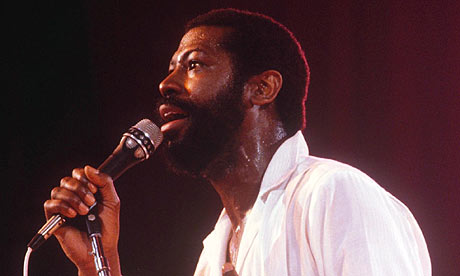Videos by American Songwriter
The world lost a part of its soul Wednesday when R&B singer and songwriter Teddy Pendergrass, known for his smooth baritone and velvety, sensual—but incomparably powerful– vocals, passed away at 59 at Bryn Mawr Hospital in Philadelphia, PA. Pendergrass had been battling colon cancer since August. His publicist, Lisa Barbaris, confirmed his death.
Pendergrass began his career with Harold Melvin and the Blue Notes, initially playing drums and singing backup but later becoming the group’s frontman. Soon, however, famed production/songwriting team Leon Huff and Kenny Gamble (responsible for songs like Billy Paul’s “Me and Mrs. Jones” and the O’Jays’ “Love Train”) signed Pendergrass to their label, Philadelphia International, having recognized his innate talent as something worthy of the spotlight.
“We signed Harold Melvin and the Blue Notes in the early ’70s,” Leon Huff told Entertainment Weekly. “Doing [their] first album we wrote a song called “I Miss You,” and Teddy was messing around in the background singing. When I heard that big booming baritone voice roll out of the background I said Gamble, ‘Listen to that voice, that voice is powerful.’ I think during that time Gamble was talking to Harold about having another singer other than himself, a powerful singer who could sing those uptempo songs and dance. And Teddy was perfect—he fit right in and me and Gamble gravitated toward his voice, starting writing everything [for him]. He could sing anything.”
A successful solo career followed in the late ‘70s, with his overall career both solo and with the Blue Notes spawning hits like “If You Don’t Know Me By Now,” “Turn off the Lights,” “Don’t Leave Me This Way” and “I Miss You.” His quick success transformed him from the God-fearing soul musician he was raised to be into a sweet-talking, ballad-crooning ladies man whose even lowest notes carried subtle notes of seduction, while still retaining a sense of gritty masculinity that similar artists of his time were hard-pressed to affect so naturally.
Not long after reaching solo success, however, Pendergrass suffered complications from a car accident in 1982 that left him paralyzed from the waist down. Though certainly hindered by the accident physically, especially initially, Pendergrass’ unfortunate disability did not keep him from continuing to make music. He went on to record several more albums (one of which, Love Language, features the 1984 duet, “Hold Me,” with soon-to-be superstar Whitney Houston), performed at 1985’s Live Aid in Philadelphia, and joining the touring musical “Your Arms Too Short to Box with God.”
Recording well into the ’90s, he retired from music in 2007 and focused on raising money and awareness for his non-profit orginization, the Teddy Pendergrass Alliance, until his death.
With his passing, music lost one of its most dynamic voices, but the spirit of Teddy Pendergrass will live on through his legacy and the profound impact he had on modern R&B and soul music.








Leave a Reply
Only members can comment. Become a member. Already a member? Log in.